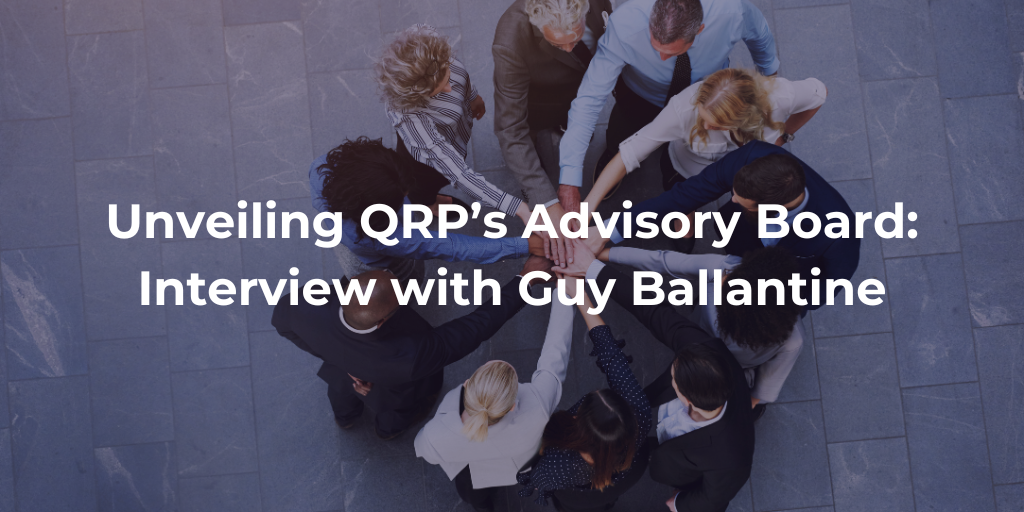Categories
Tags
Newsletter
Subscribe to the QRP International neswletter and get all the news on trends, useful contents and invitations to our upcoming events
Subscribe
At the heart of any successful company is a robust understanding of market opportunities and management best practices. That is why, in September 2023 QRP decided to implement an Advisory Board in order to develop the activities of the company. This board is composed of Carl Lenaerts, Guy Ballantine and Andrea Franco.
In order to meet the Advisory board, we had interviews to get to know them better. In today’s interview we meet Guy Ballantine, CEO, COO and board adviser. Guy gives us an interesting insight into his experience of driving complex change management in order to help a company grow and evolve.
The first half of my career, I worked in investment banking, particularly in mergers and acquisitions. Then in 2011, I decided to make a change. I wanted to work directly in the corporate world, helping businesses improve by driving rapid change, and that is what I have been doing for the last 13 years. I have had a mixture of different roles: head of corporate development, MD of a division, chief operating officer and chief executive officer. These experiences were in multiple sectors: financial advisory businesses, education, tech-enabled services, and mostly highly international businesses. All of them have been open to change and needing to evolve and I’ve loved the energy and dynamism of businesses that has brought to the teams I have led and worked with. The last eight years, I have been working for private equity owned companies, which brings a particular impetus to rapid change. Most recently I have also started taking on advisory roles to help guide other businesses in their evolution, something that my combined experience as an M&A adviser and business leader makes me particularly well placed to do.
I met the founder and CEO of QRP, Jacobus Groot, about six years ago. We met when we were both working for Thomas International, a provider of employee resource assessment tools. He talked to me about QRP and it struck me as a business providing a crucial service to individuals and companies. At the time I had a project management office (a dedicated team responsible for project oversight and delivery) reporting into me, so I was acutely aware of the benefits of training in project management and how companies like QRP provide such a valuable service. So I have stayed in touch with Jacobus and he approached me, about six months ago, saying he was putting together an advisory board to help take QRP on the next phase of its journey. I thought about it for about 30 seconds and I accepted his proposition.
In terms of methodologies and approach, historically I and my teams have tended to follow a fairly typical waterfall approach with detailed plans, and a very structured form of reporting. This has been effective and I believe that for many businesses employing such an approach will bring significant benefits. More recently whilst in technology focused business, I have experienced agile project management. I found this very effective, particularly when it came to big technology transformation projects. I have seen both approaches successfully coexist in an organisation, and collectively drive successful change.
From a personal perspective, I have had to run lots of complex projects over the years both in investment banking and in the corporate world. I have not had any formal training in project management methodology but I wish I had, but I have always been very detail oriented and structured about managing complex projects. The most important part of my role has always been the communication with stakeholders at all levels, from the most junior analysts to the board and shareholders. You can have the best plan in the world, but if your communication is poor you will fail.
To deliver multiple significant projects at once I believe you have to have dedicated and well trained project managers in a business. I have built project management office teams to do this. Their remit is to oversee, manage and execute all sizable business critical change projects within an organisation. They also ensure that senior leadership has visibility of the status of all of those projects in a way that they can understand. You can’t just hope that projects will be successful. You have to actually dedicate time, resources and people to make them successful and, crucially, you have to invest in training.
The most interesting, and probably equally the most demanding, project was when I was working at Thomas International. It was in 2020 during COVID when we were trying to build and then to launch a brand new SaaS talent assessment platform. I was CEO and so ultimately responsible for this going well. Thomas had not launched a new platform in over 20 years, so there was a huge jump forward from a technological perspective. It also had an impact on almost every single part of the Thomas business as It required a whole new way of selling and communicating with our target market. The other difficulty was that we were doing this work during the pandemic, when everyone was working remotely, under very difficult circumstances. It was difficult and stressful, but with excellent project management we got it done well and on time. Everyone in the organisation pulled together to make it happen, which was a great experience.
I am a big advocate of continual learning and training. In a world where technology is evolving so quickly, the need for ongoing training has never been greater. I think it is vital that teams are invested in that way, both by updating skills they already have, but also expanding the range and scope of those skills. I think it is a great tool for retaining employees because you are investing in them, but you get a huge amount back from it because your employees have a broader, stronger skill set. The return on investment from this process can be huge and it is often forgotten. Far too often it is the first thing that gets cut when budgets are tight. But in the medium term that is always a mistake.
There are lots of different types of training out there, from informal to more formal professional certifications. I think they both have a place, but the right professional certification is incredibly valuable. Having that formal understanding and training of best practices gives you a really strong foundation, is very tangible and great for your CV.
I think listening skills are vital, you have to actively listen to people. Be prepared to really think about what you are hearing, what feedback you are getting directly from your team and others around you. I heard a saying once on this that I love and always repeat to my teams, “no one person in the room has all the answers, but all the answers are in the room”. So, if we listen to each other we can find the answers and solutions to most challenges.
I think curiosity and a desire to learn is also super important. I will always hire somebody who is curious and has an open attitude to learning and improving. I would hire them ahead of somebody who had greater skills on day one but who did not appear to have the right mindset and desire to learn. I will back myself to help make a curious person deliver great things every time.
A soft skill that is also really powerful is resilience to cope with difficulties and challenges. Going back to project management, even with the best plan and approach things aren’t always going to go as you planned and hoped, so can you be resilient and calmly adapt to that?
I think there are two key areas to focus on. Firstly, invest time in researching what skills a good project manager has, and then map your skills and experience to that. Where there are gaps think about how you fill those gaps, either through training or access to hands-on new experience. Secondly, try to find employers, or parts of your existing employer, that are wanting and needing to change rapidly. If you are in a business that just wants to be the same and carry on doing what it is doing, that is probably not very interesting as a project manager. My most interesting roles have always been in businesses that were going through lots of complex and fundamental changes all at once. It was always challenging but ultimately very rewarding.

Senior Adviser at G3
Guy Ballantine is a CEO, COO and board adviser who transforms businesses through operational improvement, data-driven growth strategies and M&A. He has experience across Private Equity, Public Limited Company and Limited Liability Partnership businesses in multiple sectors, including HR Tech, Education and Business & Professional Services. Besides his executive roles,, Guy also enjoys combining his skills as both an adviser and commercial leader to help other senior leaders as a board adviser.